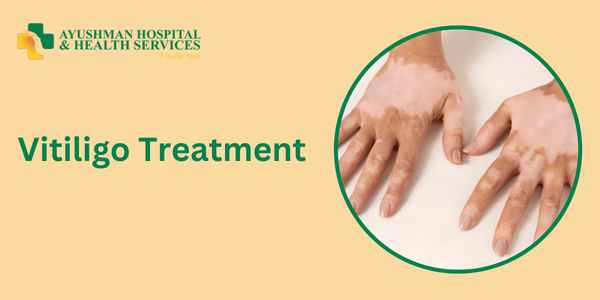Vitiligo is a skin condition that causes loss of color resulting in the formation of white patches on the body. White patches appear when melanocytes, which are the cells responsible for skin color, either stop working or are destroyed by the immune system. Although vitiligio is neither infectious nor deadly, it can have drastic psychological and emotional consequences for those affected by it. In Ayushman Hospital, Dwarka, Delhi, we offer personalized and modern treatment alternatives that help restore skin pigmentation and properly manage vitiligo.
Understanding Vitiligo: Causes and Risk Factors
At the moment, what actually causes vitiligo is still under study. However, a multitude of other factors must be considered:
- Autoimmune Disorders :-
The condition most related to vitiligo is autoimmune diseases. In autoimmune diseases, the body’s immune system goes on the offensive and, for some inexplicable reason, targets melanocytes which leads to depigmentation. - Genetic Factors :-
A family history of vitiligo suggests there is likely a hereditary component that increases the possibility of the person developing this condition. - Environmental Triggers :-
Other external factors that could possibly trigger vitiligo includes emotional stress and cuts or burns. In additions to these factors, a large amount of sun exposure can also worsen vitiligo. - Neurogenic Factors :-
Nerve related issues could also possibly be involved in vitiligo, since some scientists theorize that these issues have a damaging influence on the function of melanocyte. - Exposure to Chemicals :-
Exposure to toxins or harmful chemicals is found in some cosmetics and certain industrial workplaces, which may lead to skin depigmentation.
Forms of Vitiligo
There are different types of vitiligo:
- Generalized Vitiligo – The most widespread type, which is associated with multiple depigmented spots on the skin located in different parts of the body.
- Segmental Vitiligo – Notable depigmented regions are limited to one side of the body or a particular part of it. This form of vitiligo usually develops at an earlier age.
- Focal Vitiligo – A small area or a few localized areas are devoid of pigmentation.
- Universal Vitiligo – A type of vitiligo that is polygenic in nature and involves loss of pigmentation in nearly all parts of the body, hence the name.
All dermatologists at Ayushman Hospital carefully determine the type and severity of vitiligo in a patient before considering treatment for the condition.
Comprehensive Treatment of Vitiligo at Ayushman Hospital
1. Medical Treatment
- Topical Corticosteroids & Calcineurin Inhibitors – When the vitiligo is still in its early stages these agents can be used to prevent immune system destruction of melanocytes and promote skin pigmentation.
- Vitamin D Analogues – These agents when combined with other therapies can stabilize the disease and induce repigmentation in addition to healing of vitiliginous lesions.
2. Phototherapy (Treatment with UV light):
- Narrowband UVB Therapy – One of the best treatments available. UVB light is applied to the depigmented skin areas to encourage activities of melanocytes.
- PUVA Therapy (Psoralen + UVA light) – The treatment utilizes a pill called psoralen, alongside UVA therapy to expedite pigment restoration.
3. Surgical Treatments
- Melanocyte Transplantation – The procedure involves the transfer of healthy melanocyte cells from a pigmented or nonvitiliginous area to the zona vitiligo margine, thereby restoring pigmentation.
- Skin Grafting – This procedure involves taking pieces of normal pigmented skin and placing them in non-pigmented areas. Most successful in patients with stable vitiligo.
4. Cosmetic & Camouflage Solutions
- Medical Tattooing (Micropigmentation) – A tattooing technique used with the intent to change the skin’s color to match the surrounding skin pigmentation in vitiligo sufferers.
- Dermatological Camouflage Products – Special makeup and creams that are water-resistant and wax-like in consistency to cover non-pigmented skin areas.
Home Care and Lifestyle Tips to Prevent Progression of Vitiligo
- Protect Skin from the Sun – All vitiligo patients should have a sunscreen with broad-spectrum SPF of 30 or higher to avoid sunburn and further skin damage.
- Stay Hydrated and Eat a Balanced Diet – A diet including a variety of fruits and vegetables, can keep the skin healthy.
- Manage Stress – Stress is known to activate and worsen vitiligo, so techniques for relaxation, such as yoga and meditation can help.
- Avoid Harsh Chemicals – Use skincare products that are not known to irritate or contain harmful chemicals.
Why Go For Ayushman Hospital to get Vitiligo treated?
- Qualified Dermatologists:-
Our vitiligo experts utilize both cosmetic and surgical techniques to provide the best treatment to our patients. - Complete Care Philosophy:-
Because medicine isn’t an exact science, we take our patients’ entire medical history into account and customize their care plans accordingly. - Modern Infrastructure And Equipment:-
We have modern treatment options like UVB Phototherapy and advanced surgical techniques which ensures optimal vitiligo treatment results. - Warm Hospitality And Support:-
We ensure that patients are comfortable and emotionally stable because we prioritize their ease and comfort throughout the entire treatment process.
Schedule a consultation now!
If you or a loved one is suffering from vitiligo, reach out to a qualified professional. Ayushman Hospital is located in Dwarka, Delhi, and we look forward to assisting you with your vitiligo treatment. Reach out today to schedule an appointment with our dermatology experts!
Experiencing hair loss issues? Don’t wait until it’s too late! The best dermatologist care is just a click away.
🌐 Visit: www.ayushmanhhs.in
Would you like more information on costs, insurance, or doctor recommendations?






